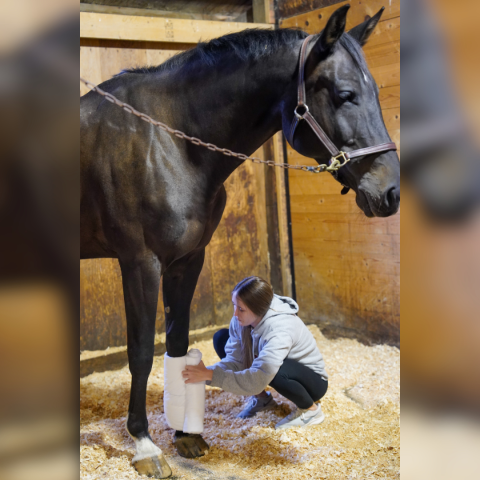What Can I Do with an Animal Science Degree?
What Can I Do with an Animal Science Degree?

Have you ever wondered how your passion for animals could lead to a rewarding and impactful career? An Animal Science degree at UNH opens doors to opportunities where you can make a difference. Whether it’s through veterinary medicine, wildlife conservation, or agricultural innovation, this field empowers you to make a meaningful impact on both animals and society. It is perfect for those who are eager to turn their love for animals into solutions for some of the world’s biggest challenges.
At the University of New Hampshire’s College of Life Sciences and Agriculture (COLSA), students are immersed in hands-on learning experiences that connect their studies to real-world applications. COLSA students don’t just learn about animals—they engage directly with them in dynamic settings, from wild habitats to state-of-the-art laboratories. This approach ensures that graduates are well-prepared to tackle some of the world’s most pressing challenges, using science to find solutions that matter.
Understanding Animal Science
Animal Science is a multidisciplinary field that focuses on understanding animals and their roles in our world. It includes studying animal biology, behavior, and nutrition, as well as the systems that support their health and well-being. Professionals in this field use their knowledge to address challenges in areas like agriculture, conservation and food production.
Animal Science students learn how to care for animals, improve their environments and ensure their sustainability. By blending theory with practice, this field equips students to make a difference in animal health, welfare and management.
Key Areas of Study in Animal Science
Animal Science programs cover a broad range of topics, allowing students to gain expertise in various disciplines. Some of the key areas of study include:
- Biology: Learn how animals function, adapt and thrive in different environments. This knowledge helps professionals understand animal health and behavior.
- Genetics: Discover how traits are inherited and used to improve livestock breeds or conserve endangered species. Genetics plays a critical role in modern agricultural and conservation efforts.
- Nutrition: Explore how diets influence animal growth, health and productivity. Students learn to create feeding programs tailored to specific species.
- Physiology: Study how animals’ internal systems, such as their circulatory or reproductive systems, operate and adapt to various conditions.
These disciplines work together to give students a comprehensive understanding of animals, their needs, and their roles in ecosystems and human industries.
Evolution of Animal Science
Animal Science has grown significantly over the years, evolving to address global demands. Early efforts in this field focused on improving livestock health and productivity. Today, animal science tackles a broader range of challenges, including food security, environmental sustainability and wildlife conservation. Advances in technology, such as genetic engineering and precision farming, have transformed the field, enabling professionals to develop innovative solutions to complex problems.
Institutions like COLSA are leading this evolution by providing students with opportunities to participate in cutting-edge research and hands-on projects. Whether it’s improving livestock systems or studying disease pathways in animals, COLSA prepares students to lead advancements that benefit both animals and humans.
Educational Pathways in Animal Science
Animal Science offers multiple educational pathways, from undergraduate programs to advanced degrees. Each level provides unique opportunities for specialization and career development.
In an undergraduate program, students gain foundational knowledge in biology, nutrition, genetics, and animal care. These programs often include practical experiences, such as internships or lab work, to help students apply their learning in real-world settings. For example, COLSA’s Animal Science (B.S.) program combines classroom instruction with hands-on opportunities, ensuring students are well-prepared for diverse careers.
Advanced degrees, such as a Master’s or Ph.D., allow students to specialize further. A Master’s degree often focuses on research or applied studies in fields like animal behavior or biotechnology. A Ph.D. program, prepares students for leadership roles in academia or advanced research. These degrees open doors to solving global challenges.

Career Opportunities with an Animal Science Degree
An Animal Science degree offers a wealth of career opportunities across various industries. Graduates can find roles in veterinary medicine, research, education, conservation and more. Here are some of the most popular career paths:
-
Veterinary Medicine: Veterinarians diagnose and treat animals, ensuring their health and well-being. Many Animal Science graduates use their degree as a steppingstone to veterinary school.
-
Livestock Management: In this role, professionals oversee the health and productivity of farm animals. Responsibilities include breeding, feeding, and implementing sustainable practices.
-
Wildlife Conservation: This career focuses on protecting endangered species and managing ecosystems. Professionals in this field often work with government agencies or nonprofit organizations.
-
Research and Development: Animal scientists contribute to advancements in genetics, nutrition, and disease prevention. These roles often involve working in laboratories or collaborating with industry partners.
-
Education and Outreach: Educators inspire future generations of animal scientists, sharing knowledge and promoting sustainable practices.
Private Sector Roles
In the private sector, Animal Science graduates can work as farm managers, animal nutritionists or veterinary technicians. These roles involve caring for animals, improving their diets, or ensuring their health in various settings, from farms to pet care facilities. Careers in animal pharmaceuticals or biotechnology are also popular, offering opportunities to contribute to innovative solutions that benefit both animals and humans.
Academic and Research Careers
For those interested in teaching or research, academic institutions offer roles as professors, researchers, or laboratory technicians. These careers enable professionals to study complex animal systems and share their findings with students and the scientific community. Working in academia allows individuals to inspire the next generation of animal scientists and contribute to groundbreaking discoveries.
Public Sector and Nonprofit Opportunities
Government agencies and nonprofit organizations also offer fulfilling careers for Animal Science graduates. In the public sector, professionals may focus on animal welfare policies or conservation efforts. Nonprofit roles often involve working with endangered species or advocating for animal rights. These careers align with global efforts to create a more sustainable and ethical future for animals.
Skills Gained Through an Animal Science Degree
An Animal Science degree equips students with both technical and soft skills that are essential for success in this field. Technical skills include expertise in genetics, physiology, and laboratory techniques. For example, students may learn to analyze genetic data or develop feeding programs tailored to specific species.
Soft skills, such as communication, problem-solving, and leadership, are equally important. Animal scientists often work in teams or communicate their findings to diverse audiences. Being able to lead projects, think critically, and collaborate effectively sets graduates apart in competitive job markets.
The Importance of Continuing Education
Animal Science is a dynamic field, and staying updated with the latest developments is crucial. Professionals can pursue certifications, such as those offered by the American Veterinary Medical Association, to enhance their expertise. Participating in workshops, seminars, or online courses also helps individuals stay current with industry trends.
Institutions like COLSA emphasize lifelong learning, providing students and alumni with opportunities to engage in experiential education. These programs prepare professionals to adapt to changes in the field and contribute to its ongoing evolution.
Networking and Professional Growth
Building connections in the Animal Science field is key to advancing your career. Joining professional organizations, such as the American Society of Animal Science, offers access to valuable resources like conferences, job boards, and mentorship opportunities. Networking with peers and industry leaders can lead to collaborations, job offers, or even groundbreaking research projects.
Shaping the Future of Animal Science
Animal Science graduates are at the forefront of solving global challenges, from improving food security to protecting biodiversity. At institutions like COLSA, students gain the knowledge, skills, and confidence to lead these efforts. By blending scientific expertise with a passion for making a difference, they contribute to creating a better world for animals and humans alike.
Every career path in Animal Science offers opportunities to explore new solutions, make meaningful contributions, and inspire others. Whether you’re in a laboratory, out in the field, or teaching the next generation of scientists, your work makes an impact that extends far beyond the present.
Your Journey Begins Now
If you’re ready to turn your passion for animals into a career that matters, consider pursuing a degree in Animal Science. At COLSA, every experience—whether in the classroom, the lab, or the wild—is designed to prepare you for a future where you can take science to new places. What will you discover about yourself and the world around you?





